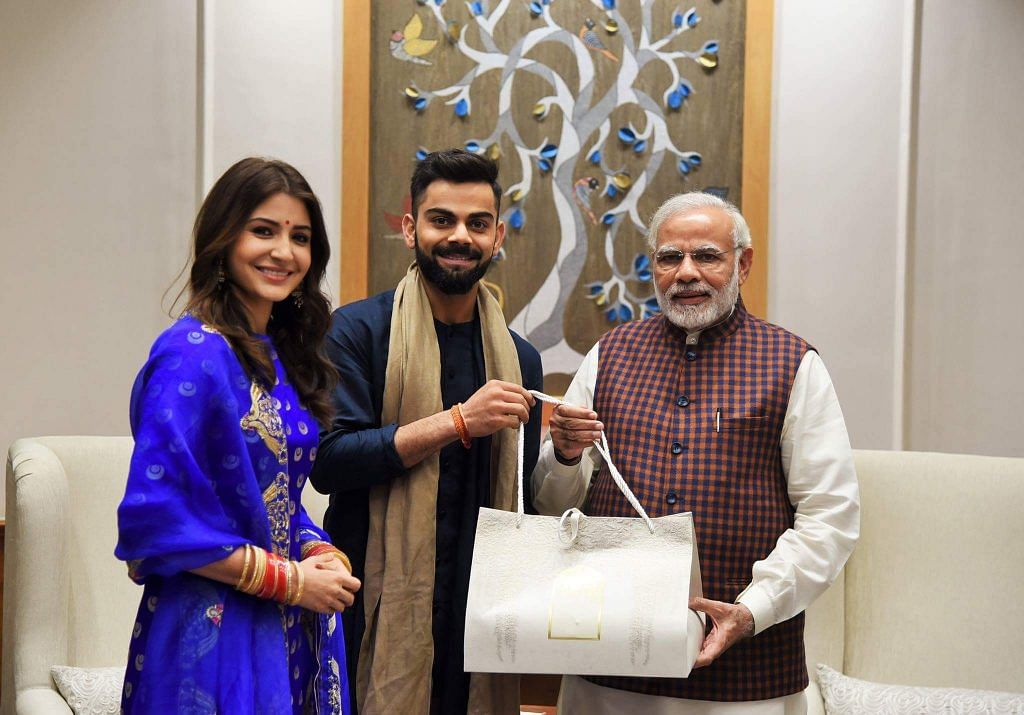This isn’t a prescription for improved governance, but is a brief recipe for more effective political leadership from Narendra Modi.
What can Virat Kohli, captain of the national cricket team and, therefore, India’s most important leader, teach Narendra Modi, the country’s second-most consequential chieftain? It’s a question worth asking as we watch the PM flounder economically (wishy-washy budget/almost no job-creation), lose steam politically (electoral setbacks in Rajasthan), and seem unusually impotent diplomatically (with the crisis in neighboring Maldives)?
I offer five areas in which Modi would do well to emulate Kohli. As with all such exercises, mine is likely to provoke a certain amount of thought (in those capable of it) and rage (in those incapable of thought). It isn’t a prescription for improved governance, of course, but is, instead, a brief recipe for more effective political leadership from Modi and demonstrably more managerial humanity.
Do things, don’t just talk.
India, a land of legendary windbags, hungers always for something concrete. It wants its leaders to deliver tangible improvement and change. With a few exceptions, Modi’s output since he was elected to office has consisted of homilies, slogans and hot air.
Some of it is unobjectionable: Who doesn’t want a cleaner Bharat, or a less filthy Ganges? Who doesn’t want foreigners to Make in India? But we deserve more than to bear witness to politicians who pose for the cameras with brooms in hand, pushing feebly at designer garbage. Or to hear gung-ho assurances that investment will come.
Virat Kohli doesn’t just boast, he delivers. He leads from the front in the most concrete way that his game offers, by scoring runs by the bushel and putting the fear of defeat into his opponents. His is the Cult of Achievement. Modi’s, so far, is the Cult of the Catch-phrase.
Be gracious to opponents
Kohli isn’t always the nicest man on the field of play. But he is a chivalrous combatant, always acknowledging an opponent’s excellence and being courtly and fraternal off the field of play.
When Phil Hughes, the Australian batsman, died from head-injuries sustained while batting, Kohli went out of his way to express his condolences. Australia was touched to its core. At the last One-Day International in Johannesburg, one had only to see Kohli’s admiring expression when a South African carted an Indian spinner for six to know that the man respects those against whom he battles. He shakes hands, pats backs, and is generous with his praise in post-match press conferences.
Modi, by contrast, has never said a nice word about a practicing politician who wasn’t from his own party. His is a Manichaean way: those against him are despicable by definition. His sour-humoured reaction to opposition MP Renuka Chowdhury’s recent laughter in the Rajya Sabha was the behaviour of a man without chivalry.
Talk to the press
There hasn’t been a prime minister in the history of India who has held journalists in as much contempt as Modi. His interactions with the media are scripted and rare, confined almost entirely to lapdog-journalists who pose the most fawning questions.
Modi, here, could learn from Kohli, who engages frankly with the media, is as unafraid of an unscripted question as he is of a bouncer from Mitchell Starc, and gives journalists the dignity of honest interaction.
When Kohli speaks to the media, we get insights into the game. And we exercise our right to hold a leader up to scrutiny. “Why did you leave Rahane out of your team? “Why did you accuse Steve Smith of cheating?” No question is ducked, and none is taboo. With Modi, a man who has the fate of India in his hands, no question is permissible, and almost everything taboo.
Remember you’re in a team sport
Cricket is a team game, but so is governance. Kohli is the consummate leader of a band (of brothers), the first among equals, but also the first to rush to a youngster and hug him if he takes a catch.
A captain is nothing without his team, and yet Modi, captain of the Indian cabinet, governs almost as if his team doesn’t exist. He has sidelined the able Sushma Swaraj, and stocked his cabinet with astonishing mediocrities, none of whom offers even the slightest political competition to the prime minister.
Please note that I write this as a man who wants Modi to succeed, to bring to India the reforms and growth that we crave. But he cannot do it all by himself. Do we see Kohli open the batting and bowling, and attempt, also, to keep wicket? No: He shares the burden. So why does Modi bigfoot into every task, field in every position?
Remember to have some fun
When Kohli plays cricket, you see a man who expresses his joie de vivre, his jubilation, and, yes, his pain. He smiles and laughs and claps, and exhorts his boys to higher things. With Modi, we get none of this humanity.
Instead, we get modulated menace, an unchanging tone of voice that signals a distaste for variety and a dislike of dissent. When he intones the Hindi word mitron—friends—at the start of a speech, the effect can be chilling. He’s addressing you as a friend, to be sure, but also putting you on notice, telling you that you’re an acolyte, a subordinate. It’s a joyless appeal from an ascetic man—a man who neither gives, nor expects, any tenderness.
Tunku Varadarajan is the Virginia Hobbs Carpenter Fellow at Stanford University’s Hoover Institution.
